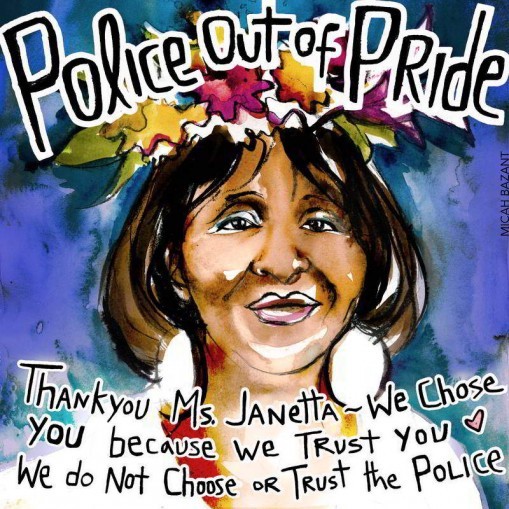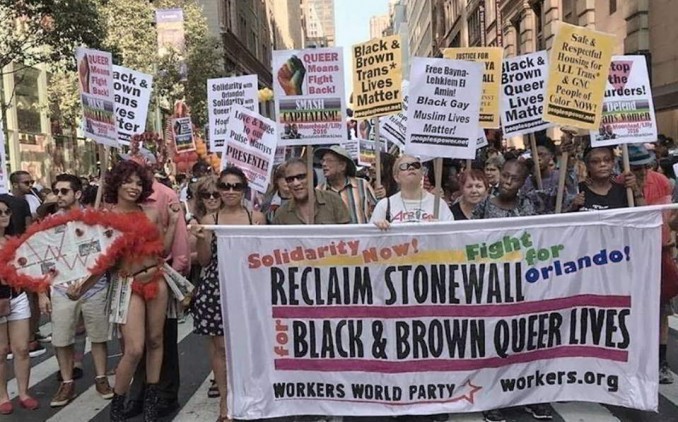LGBTQ groups call for ‘Police out of Pride!’
 Millions marched worldwide on June 26 to mark the 1969 rebellion at the Stonewall Inn in New York City that sparked modern LGBTQ liberation movements. In that uprising, gay, lesbian, bisexual and trans people — mostly people of color — fought back against daily harassment and brutality by police. Though recent Pride marches in the U.S. had become more celebration than political demonstration, the recent massacre of 49 mostly LGBTQ people of color in Orlando, Fla., refocused Pride this year on political issues.
Millions marched worldwide on June 26 to mark the 1969 rebellion at the Stonewall Inn in New York City that sparked modern LGBTQ liberation movements. In that uprising, gay, lesbian, bisexual and trans people — mostly people of color — fought back against daily harassment and brutality by police. Though recent Pride marches in the U.S. had become more celebration than political demonstration, the recent massacre of 49 mostly LGBTQ people of color in Orlando, Fla., refocused Pride this year on political issues.
In New York City, the parade’s lead float was dedicated to the Orlando martyrs, and there was a brief “die-in” for gun control on Christopher Street. Forty-nine people wearing full-length white veils down to their feet marched, each holding a photo of one of the dead.
But the most emphatic political message was carried by the Workers World Party contingent. Its lead banner “Solidarity Now! Fight for Orlando!” acknowledged the overwhelming loss there of Black and Latino/a lives with the message, “Reclaim Stonewall for Black and Brown Queer Lives.” Some signs in the contingent had rainbow fists and the slogans “Queer Means Fightback!” and “Smash Capitalism!” Marching with WWP were members of the People’s Power Assembly.
Much was made of Democratic Party Presidential Candidate Hillary Clinton joining the march for 15 minutes. But Clinton, and her reluctant and long-delayed endorsement of full rights for LGBTQ people, stood in stark and negative contrast to Workers World Party 2016 Presidential Candidate Monica Moorehead, who marched in Pride as she does every year. Moorehead is a decades-long activist for full LGBTQ rights, which she endorsed in each of her previous campaigns in 1996 and 2000.
In both New York and San Francisco, the two biggest Pride marches in the U.S., the state responded to the Orlando deaths with a massive police presence. In New York City, roving counterterrorism units, bomb-sniffing dogs, rooftop observation posts and police helicopters were deployed while thousands of uniformed cops lined the parade route.
San Francisco honorees withdraw
In San Francisco, where the Pride theme was ““For Racial and Economic Justice,” police announced there would be a significant uniformed and undercover police presence. For the first time those attending the Pride Festival had to pass through metal detectors and were subjected to a body search.
In response to this show of force, three major participants withdrew from the parade and celebration: Black Lives Matter Bay Area; St. James Infirmary, a sex worker health clinic; and TGI Justice Project‘s Janetta Johnson, a community grand marshal. BLM was to have marched as recipient of SF Pride’s Lifetime Achievement award, and St. James Infirmary had received the Heritage of Pride award. TGI Justice is “an organization by and for trans, gender non-conforming and intersex people in prisons, jails and detention centers.”
In a jointly issued statement, they emphasized they were withdrawing “because of the unsafe conditions created for our communities by law enforcement.” Shanelle Matthews of BLM Bay Area added: “Black communities experience real fear and terror at the hands of homophobic vigilantes and law enforcement, and we work every day to find solutions. We know the militarization of large-scale events only gives the illusion of safety.”
Stephany Ashley, executive director of St. James Infirmary, noted: “LGBT sex workers are often victims of violence and exploitation at the hands of police. The increased police presence … as well as the ban on shopping carts and items typically belonging to marginally housed and homeless people will only make Pride less safe and accessible to our communities.”
Resistance is growing to the state ramping up its cop presence under the pretext of “safety” for LGBTQ people. On June 19, the LGBTQ youth group BreakOUT! withdrew from the New Orleans Pride parade, despite being chosen as an organizational grand marshal.
They noted the streets of the city would fill with “NOPD officers, the FBI, Louisiana State Troopers, Orleans Parish Sheriffs, and private patrols,” and dramatically described the danger this posed to their members, “many of whom are undocumented, youth with negative experiences with police and sheriffs, including sexual violence, youth who feel unsafe and triggered when our bodies and belongings are searched, and youth who have already been the targets of private patrols and security.”
BreakOUT! then called for the LGBT community to “chart a course forward that doesn’t rely on state systems, but rather community, to keep us safe.” (youthbreakout.org)


